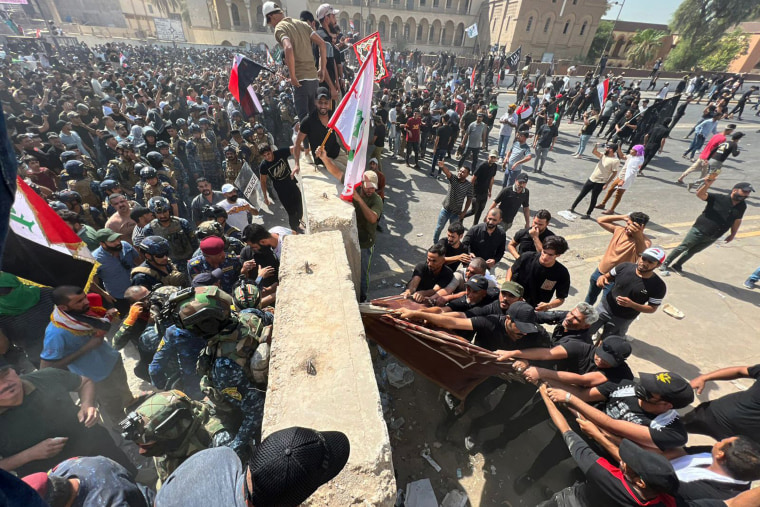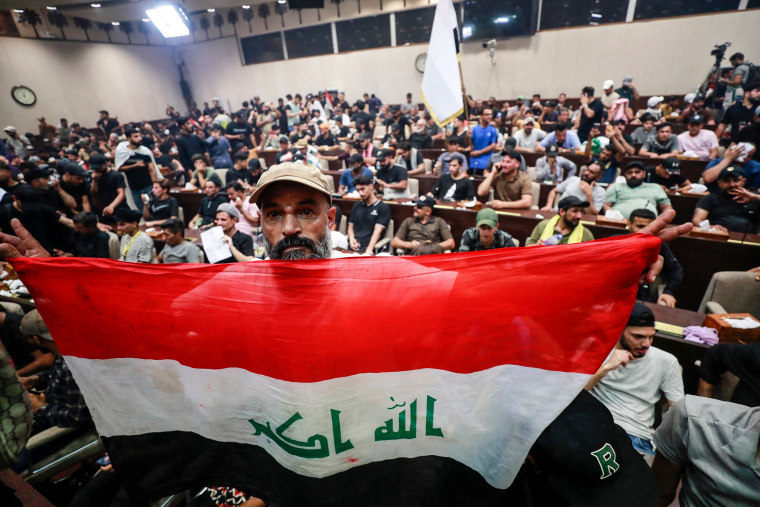BAGHDAD — Dozens of people were injured when protesters breached Iraq's Parliament for the second time in a week.
The country's Health Ministry said 100 civilians and 25 security personnel were injured after demonstrators swarmed Baghdad's fortified Green Zone, which houses official buildings and embassies, and surrounded it in all four directions.
The protesters, largely made up of followers of the influential Shiite cleric Muqtada al-Sadr, were demonstrating against efforts to form a new government led by Iran-backed groups.
After using ropes to pull down towering concrete walls, the protesters were met by anti-riot units who deployed hot water, tear gas and pepper gas against them.
 Protesters try to remove concrete barriers to cross the bridge toward the Green Zone area in Baghdad on Saturday.Ali Abdul Hassan / AP
Protesters try to remove concrete barriers to cross the bridge toward the Green Zone area in Baghdad on Saturday.Ali Abdul Hassan / AP Other demonstrators were seen walking toward the federal court and the Supreme Judicial Council building.
A previously planned parliamentary session was canceled on Thursday, and there were no lawmakers present in the building.
The country's caretaker prime minister, Mustafa al-Kadhimi, directed security forces to protect the demonstrators and asked them to keep the protest peaceful.
"I call on everyone to be calm, patient and rational, and not be drawn into confrontation, and I call on citizens not to clash with the security forces and to respect state institutions," he said in a statement.
The crowds gathered after calls by al-Sadr to protest the nomination of Mohammed Shiya al-Sudani as the official nominee for prime minister, by the Coordination Framework, an Iran-backed alliance of Shiite parties.
 A man holds a national flag while protesting inside Iraq's Parliament in Baghdad's high-security Green Zone on Saturday.Ahmad Al-Rubaye / AFP via Getty Images
A man holds a national flag while protesting inside Iraq's Parliament in Baghdad's high-security Green Zone on Saturday.Ahmad Al-Rubaye / AFP via Getty Images Al-Sadr, who recently stepped down from the political process despite having won the most seats in the October federal election, said Wednesday that politicians could not choose a prime minister or a government without involving him and getting his approval.
He exited the government-formation talks after months of stalemate, when he could not secure enough lawmakers to reach the majority required to elect the next president.
Parties must first select a president before the current nominee, al-Sudani, can face the Parliament to be officially designated as the next leader.
The Coordination Framework leaders replaced al-Sadr's lawmakers after his exit and pushed ahead to form the new government.
In his statement, Al-Kadhimi said the "political blocs must sit down, negotiate and understand for the sake of Iraq and the Iraqis, and the language of treason and exclusion must be avoided, and a high and all-embracing patriotic spirit must be displayed."
Many fear that doing so prompted the protests organized by al-Sadr's large grassroots following and the current instability. The firebrand cleric is a fierce critic of Iran and the U.S., and was once the poster boy for the violent resistance against the U.S.-led invasion of Iraq
Al-Sadr is also blamed for the mass killings of Sunni civilians in sectarian violence that peaked in Iraq during 2006 and 2007.
The Pentagon once said the Mahdi army, which al-Sadr formed in 2003 after the fall of Saddam Hussein's regime, had "replaced al Qaeda in Iraq as the most dangerous accelerant of potentially self-sustaining sectarian violence."
In 2016, al-Sadr supporters stormed the Parliament in a similar fashion. They staged a sit-in and issued demands for political reform after Haidar al-Abadi, who was then prime minister, sought to replace party-affiliated ministers with technocrats in an anti-corruption drive.
Khalid Razak reported from Baghdad and Mithil Aggarwal from Hong Kong.
Khalid Razak
Associated Press contributed.

Post a Comment